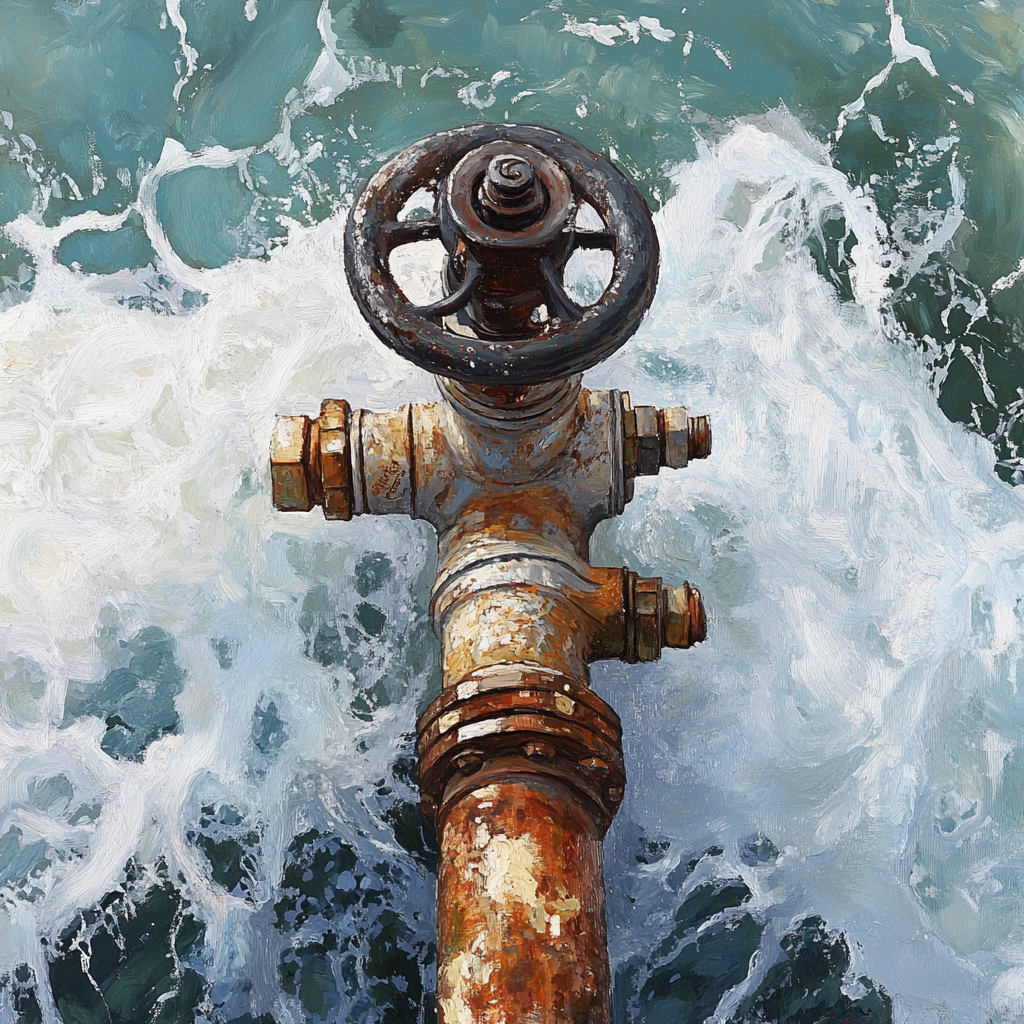When dealing with salty or saline water, choosing the right shut-off valve is crucial to ensuring long-lasting performance, minimal maintenance, and preventing failures that can lead to costly downtime. Salty water environments present unique challenges due to corrosion and material degradation, which can quickly compromise the integrity of valves not specifically designed for these harsh conditions.
In this article, we’ll discuss the key considerations when choosing a shut-off valve for salty water applications, and how Elephant’s specialized valve solutions can help solve these challenges efficiently and cost-effectively.
Why Choosing the Right Valve Matters in Salty Water Applications
Salty water or seawater is highly corrosive due to the presence of salts, particularly chloride ions, which can cause pitting corrosion and general degradation of materials over time. When choosing a valve for salty water applications, it is essential to ensure that the valve is made from corrosion-resistant materials and designed to withstand the constant exposure to harsh conditions.
Let’s illustrate the problem:
Example: "What happens if you use a regular brass valve in a salty water system?"
Here is a photo of a standard brass valve installed in a saline environment after 3 months. You can clearly see the pitting corrosion and material degradation. The valve is no longer functional, causing flow restrictions and leaks. Not only does this compromise system performance, but it also increases maintenance costs.
This is a perfect example of why choosing the wrong material, such as brass, for salty water applications can lead to catastrophic failure.
Choosing the Right Valve Series from Elephant
Elephant offers a range of valves specifically designed for aggressive environments, including saltwater. When dealing with salty water, it is essential to choose valves that are made from stainless steel, high-grade alloys, or other corrosion-resistant materials that can handle the harsh effects of saltwater exposure.
1. Elephant WCB-316L Butterfly Valve (Stainless Steel Series)
One of the top choices for salty water applications is the WCB-316L Butterfly Valve. This valve is made from 316L stainless steel, a material known for its superior resistance to corrosion, especially against chlorides found in salty water. It is highly durable and can handle a wide range of temperatures and pressures without compromising its integrity.
Why It’s Perfect for Salty Water:
- 316L Stainless Steel is a much better material for resisting saltwater corrosion compared to brass.
- EPDM Seals ensure a secure, leak-proof closure even when exposed to harsh environments.
- Long lifespan in aggressive media, reducing the need for frequent replacements and minimizing maintenance costs.
2. Elephant Ball Valve (316L Stainless Steel Series)
Another great option is the Ball Valve Series, which also features 316L stainless steel. These valves are ideal for high-pressure applications where a tight seal and precise shut-off are required. The ball valve design ensures minimal flow resistance, making it a highly efficient choice for salty water systems.
Why It’s Perfect for Salty Water:
- The 316L stainless steel construction provides excellent resistance to corrosion from chloride ions.
- The smooth surface finish reduces the risk of salt deposits and minimizes the maintenance required.
- Easy operation and excellent sealing performance in challenging environments.
Elephant’s Approach to Solving Maintenance Challenges in Aggressive Environments
When operating in aggressive environments such as those involving salty water, maintenance is always a concern. The more corrosive the environment, the more frequently maintenance might be required, leading to increased downtime and costs. Elephant offers solutions that make valve maintenance more straightforward and cost-effective, even in these challenging environments.
1. Modular Design for Easy Replacement
Elephant’s valves are designed with modular components, which means that parts such as seals, diaphragms, and other internal components can be easily replaced without needing to replace the entire valve. This is especially beneficial in salty water environments where frequent replacements may be necessary due to corrosion.
How It Helps:
- Reduced downtime as only the affected components are replaced.
- Lower maintenance costs by allowing you to replace individual parts instead of the entire valve.
- Quick repairs in the field, reducing the impact on operations.
2. Sealing and Protection of Coils
In aggressive environments, like salty water systems, the sealing of coils becomes critical to prevent failure due to corrosion. Elephant valves feature advanced coil sealing technology to ensure that the electrical components remain intact even when exposed to corrosive environments.
How It Helps:
- Enhanced durability of electrical components.
- Improved performance and reliability, reducing the need for frequent coil replacements.
- Longer service life for the valve, reducing operational costs over time.
3. High-Quality Materials for Corrosion Resistance
Elephant valves use materials specifically chosen to resist corrosion, such as 316L stainless steel and special alloys, that are ideal for saltwater and other aggressive environments. This minimizes the wear and tear caused by constant exposure to harsh fluids.
How It Helps:
- Longer valve life, reducing replacement costs.
- Reliable performance in challenging environments, reducing unexpected failures.
- Minimized risk of operational downtime and associated costs.
Conclusion
Choosing the right shut-off valve for salty water applications requires careful consideration of material compatibility, durability, and the valve’s ability to withstand the corrosive effects of saline water. Elephant’s specialized valve series, such as the WCB-316L Butterfly Valve and Ball Valve (316L Stainless Steel), offer superior resistance to corrosion, long-lasting performance, and easy maintenance.
With modular design for component replacement, coil sealing protection, and the use of corrosion-resistant materials, Elephant valves ensure that your system operates efficiently and with minimal downtime, even in the most aggressive environments.
By choosing the right valve for salty water, you can significantly reduce maintenance costs, increase system reliability, and extend the lifespan of your equipment. Let Elephant help you make the right choice for your application.
